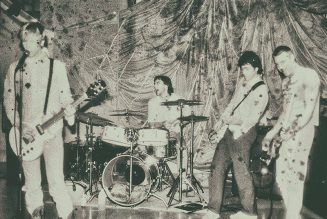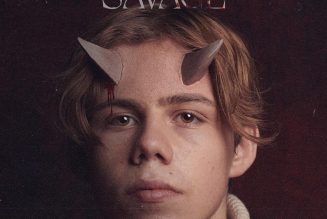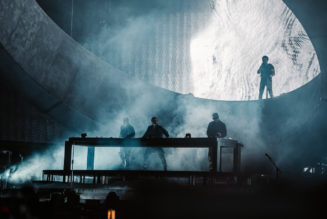Operating behind a black and gold mask while dishing out forward-thinking trap beats over the past decade, enigmatic producer UZ has undoubtedly managed to craft his own style, solidifying himself as a true electronic music trailblazer. After achieving viral success in 2012 with his “Trap Shit” series on Diplo’s Mad Decent imprint, UZ took his bass-heavy sound to stages around the world, developed his own Quality Goods Records label, and established himself as an underground legend.
It was in 2017 when, alongside the release of his debut album Layers, UZ decided to take off the mask, revealing himself as the two-time DMC winning DJ Troubl, as well as enigmatic UK house producer Plezier. A massive moment for UZ, Layers was followed up by 2018’s The Rebirth, when the producer revamped his iconic mask for a sharper look. Fast-forward to 2020, and UZ is ready for the next—and final—chapter in his journey with his highly-anticipated Trinity LP.
Spanning 15 tracks, Trinity sees UZ put his mask to the side while combining influences from all his three of his aliases, as well as 20 years of production experience. The result is arguably his most ambitious and versatile project to date, filled with a slew of features and a heavy dose of thunderous bass and intoxicating melodies. Buzzing rappers such as SoloSam, Twnty8, Snowy, and Vinny Virgo deliver electrifying verses all over the project, representing the most hip-hop influences present in any UZ album so far. The record also features production from a bevy of gifted beatmakers, such as DECAP, Holly, HUCCI, and Brothel, among others.
We had the distinct pleasure of picking UZ’s brain ahead of the release of Trinity, discussing the story behind the album, his journey towards sobriety, his creative process, and more.
EDM.com: Why did you choose to name the album Trinity and what’s the story behind it?
UZ: Trinity is going to be my final album, so I wanted it to be the best. I went through a lot of different concepts during the making of it, and when it was finally done, I just had a vision of the trinity concept. I have three different aliases: DJ Troubl, Plezier and UZ. I’ve also lived in three different cities in my life: Paris, London and Los Angeles. Paris was DJ Troubl since it’s my country. When I moved to the UK I was influenced by UK bass stuff and Plezier was born, and when I moved to LA it was more trap stuff, so it’s all connected like a triangle.
Everything felt related to the number 3 and trinity; it’s almost like grouping everything and making a new identity, which is not only UZ, but all of them together as well. That’s why the album is so different. Rap, grime, more melodic stuff, more scratching—everything is mixed because it’s all my aliases combined.
EDM.com: Apart from your classic trap sound, Trinity offers man different tempos and musical styles while combining those three different music aliases. What was your creative process like when bringing these three different sounds together?
UZ: Originally, I didn’t really like to mix stuff, so when I had a name I just stuck to it. When I was making music for UZ, it was really dark, slow tempo and everything was raw. In this album, I’m combining a lot of different styles and influences, taking more happy chords and all that.
The title track “Trinity,“ for example, is more melodic and a little bit faster. I was not in the mindset of just UZ. This is an album about me, the person and the artist. I felt like I was a little stuck with UZ; everybody expects dark stuff and the same tempo and everything, so I wanted to change things up, open a new door for what’s coming next and show everything I can do.
EDM.com: Throughout your career as UZ, you’ve worked alongside dozens of artists. Trinity is also packed with features. How did all these collaborations come about and what were you looking for in the artists you worked with?
UZ: Most of the time, when I’m sending out a track, it’s to someone that I really like personally. I’m not going to go after someone who is really hyped or famous—I’m more about collaborating with nice people that I enjoy working with. If it’s a rapper or a singer, after they record over it, I put the final touches, add some scratches and finish everything. Sometimes I have people come to my studio, but usually I work with artists through the Internet, and most of the collaborations on Trinity have come together like that.
SoloSam, for example, I sent him “Fire” and he recorded a dope verse over it. UNKWN as well, I had made most of “Contrast” and felt like I needed a second drop, so I sent him that. The DECAP, Bishu and Snowy collaborations were created virtually as well. I met Twnty8 online, and then we met in person and shot a music video for “I Can” in the desert, while Holly, on the other hand, came to my place and we worked on “Rockstar” together. I always like to keep it personal with the people that I work with. With huge rappers it’s not organic; they require you to pay them and you’re not sure if they are going to respect the deadlines. That’s just not something I do.
EDM.com: You mentioned in a press statement that you have been writing music under the influence for 15 years now, yet almost two years ago you made the decision to get sober. Tell us about your journey towards sobriety and how this new lifestyle impacted the creation of the album.
UZ: It’s been game-changing for me. I’ve been doing drugs and drinking alcohol for a good part of my life, and two years ago I decided to go sober. “Cold turkey,” as they say—just quit everything. I felt like it was time for me to be clean, and it just changed my life.
I feel way better. I’m a better person, my vision is super clear and I’m writing the best music I’ve ever written. I think it was really cloudy in my mind before, and now I feel like myself really. I used to write music totally drunk, and wake up the next day without remembering what I was doing. The music was good, but that wasn’t the right way to do it. Now, I can stay working on tracks for eight hours straight and be super clear-minded; it’s just better for me. I feel like this album is the best music I’ve done so far and this had a lot to do with me getting sober.
EDM.com: The whole visual identity of UZ has been a vital part of the project so far. People can tell a lot of work is being put into your graphics, photoshoots and stage visuals. How do you think the visual aspect influences the way a listener experiences a piece of music? Is it as important as the music itself or merely an extra aesthetic choice?
UZ: It depends. For me, the visual experience was really important since my face and identity were hidden. Some artists just try to catch the attention with their personality, as an entertainer or influencer almost. The mask, the black and gold stuff, the kind of dark and mysterious identity was great in the first four to five years; the music was the most important, and after that came the visual experience.
Then in 2017 I decided to reveal myself—just because I felt like I needed to connect more with people as a person—and I wanted them to know my history too. I’m not just a trap producer, I’m an artist who has been making music for the past 20 years. For this album, I’m trying to put the mask on the side; it’s still always there but it’s not on my face. I want people to look at me as a guy who has good taste in music and good taste in fashion. We’ve been doing the black and gold for eight years, so I wanted to do something different that’s a bit more edgy. We went in a totally different direction with the visuals on Trinity as well. We worked with a great graphic designer from LA called Cat Owens who did the whole album, the videos and symbol, et cetera, as well as Alex Crane, who did an amazing shoot.
EDM.com: When it comes to trap music, especially combining it with more electronic elements, you are an undisputed pioneer. Looking at trap music in the electronic scene over the past 10 years, how do you think it has changed and evolved?
UZ: Originally, trap music was southern music. It’s not really electronic; it has 808s but it’s rap. I feel like now I am the evolution of trap and rap. When I started, I was doing instrumentals with a little but more bass and punch—no drops and buildups—and after some years I was put into the EDM stuff, so my sound changed a little bit.
I feel like the trap sound was simpler years ago. In 2012 and 2013 it was really minimal and bass-heavy, with simple melodies and great energy. I feel like dubstep was too much, so people needed a little bit more simple stuff. That’s why trap music blew up in the electronic world around that time. Then came hybrid; the dubstep kids wanted that hard sound back, so the producers mixed everything together well. It got super noisy at some point, but now it’s a mix of bass and trap influences, like PEEKABOO, for example, who blew up a couple of years ago. So yeah, from 2012 it moved from minimalistic bass to now a more edgy, modern feel.
EDM.com: Trinity feels like a return to your roots. Was that on purpose? Is this where you see trap music going in the future?
UZ: I don’t know; most producers nowadays do more weird, sound design-driven music. Personally, I’m more into minimalistic melodies and simple, catchy stuff. Someone similar to me would be Troyboi. He doesn’t go too crazy; he always keeps his own sound. I feel like it’s the same with me, it’s not just trap but rather the UZ sound that is unlike anybody else
So, with the album, I’m not trying to state that everything should sound like this. It’s more like, “I’ve been doing music as UZ for almost 10 years now, and this is what I feel like is the best evolution of me, and the best version of UZ music.” I don’t know if it’s what I want people to make, but it is what I want people to listen to and be like, “Wow that’s the best stuff I’ve heard from him.”
EDM.com: You open up a blank, clean Ableton Live session. What is the first thing you do?
UZ: Melodies! I put Omnisphere on a track, for example, and I start with a melody, always. It’s funny because after laying down all the melodies, I structure everything, and the beat comes at the end. Then, the very last thing I do is the bass. It’s crazy. If the bass is too low, I just pitch all the instruments up. It’s a very weird technique but it has worked so far (laughs).
EDM.com: We’re here, and you have just released your final and biggest project to date. Where do things go from here?
UZ: Well, it’s probably not my final music I’m putting out as UZ, but it is for sure my final album. I have a few more tracks that are ready, but I’m not sure about how I want to release them. I might do a deluxe version of the album and add some tracks and remixes. I’m not going to tour like crazy like I’ve done before, but we’ll probably do shows if they are good ones. We’re close to the end of the project I would say.
Right now I’m working on a new alias. It’s less electronic, it’s just music like I used to do before, nothing that people have heard yet though. I’m also going to produce more rap and hip-hop tracks for French and global artists. I feel like I want to go back to more musical stuff; I’m getting at that age where I’m 42 and I don’t really listen to crazy music, so I want to make music for people like me to enjoy. It’s probably not going to be under an anonymous alias as well, I will most likely show myself.
I’m also not going to make it as big as UZ though. UZ was pushed really hard and I want this to be natural, not too big too fast. I just want to take it easy, make the music that I love and have fun with it.
FOLLOW UZ:
Facebook: facebook.com/UZBalltrap
Instagram: instagram.com/balltrapmusic
Twitter: twitter.com/BallTrapMusic
Spotify: spoti.fi/396zZYV

![UZ Opens Up About His Final Album “Trinity,” Getting Sober, and the Future of Trap Music [Interview]](https://www.wazupnaija.com/wp-content/uploads/2020/10/uz-opens-up-about-his-final-album-trinity-getting-sober-and-the-future-of-trap-music-interview-1050x600.jpg)

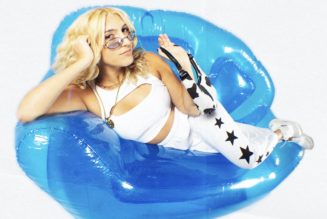
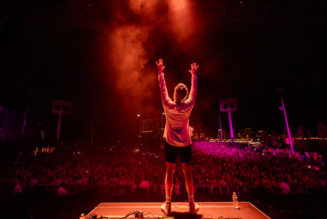
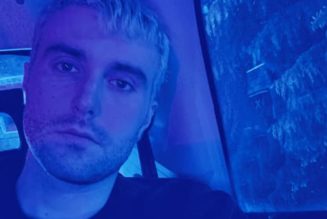
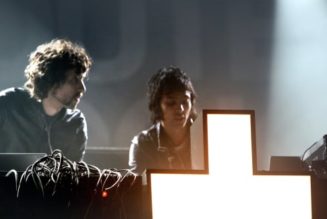
![Mersiv Channels Healing Energy into Fryar Collab Project, “Paradise” [Premiere]](https://www.wazupnaija.com/wp-content/uploads/2020/09/mersiv-channels-healing-energy-into-fryar-collab-project-paradise-premiere-scaled-327x219.jpg)
